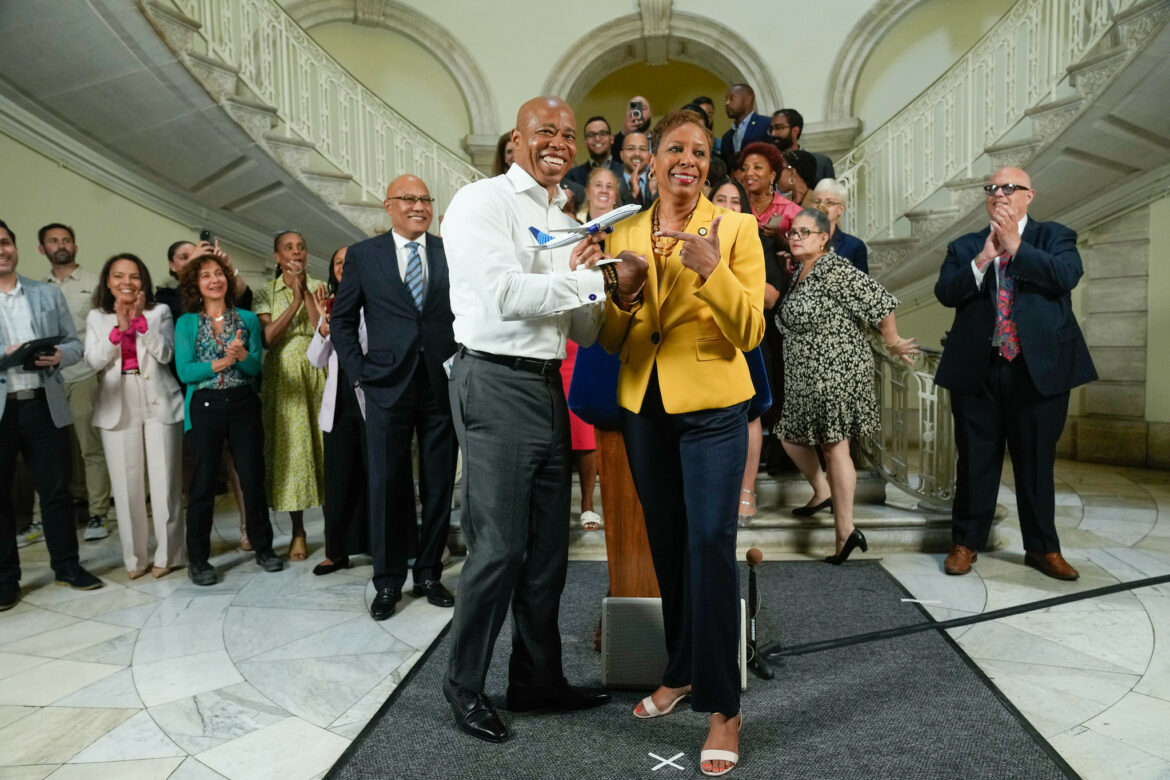
Here’s What the Latest NYC Budget Includes for Housing
Housing advocates in the City Council scored wins—including an additional $2 billion in capital funds for the Department of Housing, Preservation and Development (HPD) and the New York City Housing Authority (NYCHA)—but more is needed, they say.
Michael Appleton/Mayoral Photography Office
Mayor Eric Adams and Council Speaker Adrienne Adams announcing the new budget deal at the end of June.
The City Council’s fight for additional financing for New York City’s main housing agencies has paid off, with a funding boost that lawmakers say will breathe new life into struggling and dormant affordability programs.
Following the finalized $112 billion city budget deal announced at the end of June, Mayor Eric Adams lauded an additional $2 billion in capital funds to the Department of Housing, Preservation and Development (HPD) and the New York City Housing Authority (NYCHA).
The money will be divided over the next two years, with $1 billion for housing construction and preservation funds in fiscal year 2025, which kicked off July 1, and another $1 billion to sustain that work in fiscal year 2026.
“We’re saying that we are serious,” Adams said at a press conference, noting that the additional funding brings HPD’s 10-year capital plan to a record $26 billion.
NYCHA will see an extra $350 million annually, while $650 million a year will go to HPD, including funding to shore up two affordable housing programs that councilmembers have pushed for. But it falls short of the $3.66 billion in additional capital money over the next five years sought by the Council’s Progressive Caucus.
“I’m glad to see the affordable housing investments that we were able to win in this budget, but there’s a long way to go,” said Councilmember Pierina Sanchez, who chairs the housing committee.
“There’s a long list of changes that we need to make, further investments we need to make, and even changes in terms of the operational efficiencies of our agencies; the capacity even to spend these funds and to get projects online and to build, build, build,” she said.
Back in March, Sanchez and fellow Progressive Caucus members created the “Homes Now, Homes for Generations” coalition in response to Mayor Adams’ preliminary budget, which was released in January. The coalition pressed for additional financing for two underfunded HPD initiatives: Neighborhood Pillars and the Open Door program, both of which will now receive injections of funding for the next two years.
Neighborhood Pillars was created under the de Blasio administration to assist nonprofits and community organizations in purchasing and renovating rent stabilized housing for low- to moderate-income households, offering low-interest loans and tax exemptions. However, it only managed to preserve 400 apartments before having its funding cut entirely in 2020.
With the new budget, the program will see a $30 million reinvestment split between fiscal years 2025 and 2026. Still, it only amounts to 6 percent of the $250 million annual investment the Council requested in its response to the mayor’s budget.
The Open Door program was created in 2017 to help finance the construction of one- to three-family homes, as well as coop and condos, for moderate- and middle-income households. The program has built fewer than 500 homes in the last decade thanks to under funding, advocates say. The Council requested an additional $250 million a year for the program, but received 22 percent of that ask: $55 million per year for the next two years.
Still, housing advocates say the final budget is a vast improvement to Mayor Adams’ initial proposal, which included a 20 percent reduction for HPD’s capital funding compared to fiscal year 2024. This could have spurred a 32 percent drop in the number of affordable residential units financed by the agency in the year ahead, according to a May report from the New York Housing Coalition (NYHC), a nonprofit that advocates for affordable housing policies.
“This capital infusion will help boost new construction and preservation of affordable housing, which was in jeopardy of decreased production this year due to rising costs,” Rachel Fee, the executive director at NYHC, said in a statement to City Limits. “It will also help make the needed capital repairs at NYCHA, where residents have been waiting far too long for critical building systems and apartment upgrades.”
The additional $2 billion also includes $136 million for the Extremely Low & Low-Income Affordability Program (ELLA), which finances the construction of multifamily rental projects with the deepest affordability levels, surpassing the Council’s initial request of $75 million.
Ayman Siam/Office of NYC Comptroller
The Council’s Progressive Caucus, along with the city comptroller and public advocate, announced the “Homes Now, Homes for Generations” campaign in March to push for more housing funding.
“I’m really happy to see that the low-income investments in this budget, the ELLA term sheet, the extremely low and low-income housing, that’s in there,” said Sanchez. Allowing the city to create housing with the deepest affordability levels “is really good,” she added. “But we’re gonna need more than that.”
Looking to the future, Sanchez said the Council will continue to push for more affordable housing vouchers through the City Family Homelessness and Eviction Prevention Supplement, or CityFHEPS, program.
The budget included $614.9 million for CityFHEPS for fiscal year 2025, a significant increase (the city spent $499 million for the program in fiscal year 2023 but budgeted only $288 million last fiscal year, according to the Independent Budget Office).
Going forward, CityFHEPS funding will be base-lined in future years at $540.3 million annually, what housing leaders described as a win for the program, which helps low-income New Yorkers cover their monthly rent payments and is a key tool for moving people out of the shelter system.
But the Adams administration is still refusing to implement a major expansion of CityFHEPS that the City Council passed last year, which would make more people eligible for the subsidies. The Council has joined an ongoing lawsuit to force City Hall to comply with the legislation.
“We’re not close to what this Council legislated last summer and overrode the mayor’s veto on, in terms of expanding access to CityFHEPS vouchers,” said Sanchez.
To reach the reporter behind this story, contact Chris@citylimits.org. To reach the editor, contact Jeanmarie@citylimits.org
Want to republish this story? Find City Limits’ reprint policy here.
The post Here’s What the Latest NYC Budget Includes for Housing appeared first on City Limits.


